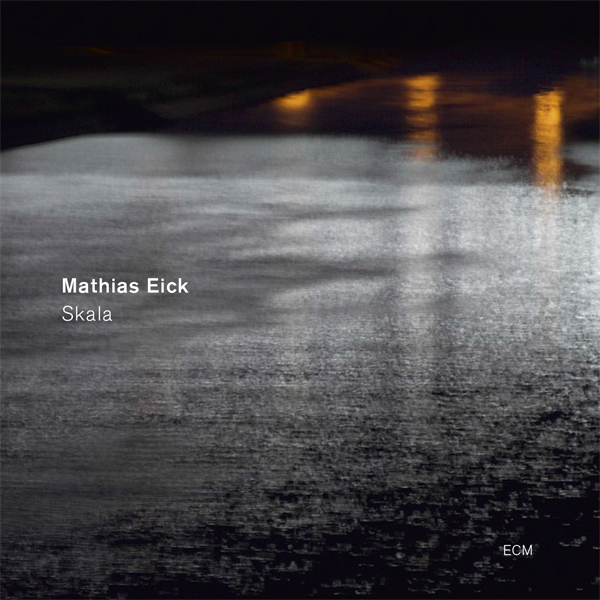
Mathias Eick – Skala (2011)
FLAC (tracks) 24 bit/96 kHz | Time – 41:39 minutes | 746 MB | Genre: Jazz
Studio Masters, Official Digital Download – Source: Qobuz | Booklet, Front Cover | © ECM Records
Recorded: December 2009 and January 2010 at Cabin Recorders, Bugges Room, and Pooka Studio, Oslo
Norwegian trumpeter Mathias Eick’s new album extends the concept and the panoramic sweep of his ECM debut “The Door” (recorded 2007). “It’s wider and bigger in all directions,” Eick says. “Skala” calls upon the services of more musicians – including, at times, two drummers – and there is more detail in the arrangements. What hasn’t changed is the emphasis on the lyrical soloist at the centre of the production. Eick’s elegant trumpet now has a larger space in which to sing.
“Skala” pools new and older compositions, all written by Mathias, and inspired, he says, by music from classical to pop. The title tune is one that the trumpeter says has been following him “for many years”, its network of inspirations including Sting’s 1993 song “Shape of My Heart”. “Edinburgh” was written in the Scottish city, but draws inspiration from Norwegian composer Edvard Grieg and the plaintive cry of Jan Garbarek’s sax. Eick describes “June” as “a light and peaceful song, a reminiscence of summer days”. The piece incorporates the harp of classical player Sidsel Walstad, currently of the Norwegian Broadcasting Orchestra.
“Oslo”, the album’s most propulsive tune, is a “song of the city. It’s a groove-directed piece.” It also “brings the idea of the two drummers into play. It sets them loose.” The piece also includes significant contributions from keyboardist Morten Qvenild, best known for his work with singer Susanna Wallumrød. “Joni” is, of course, for Joni Mitchell, whose work Eick has long admired. “Biermann” is named after the Oslo house that Eick rents, a place once owned by German merchant J. F. Biermann, back in the 19th century. “The Day After” references the 1970s, and is influenced by sources as diverse as the Jarrett/Garbarek ‘Belonging’ collaboration and the pounding rock piano of Elton John. “Epilogue” develops “from the simple idea of softness meeting raw energy”, as Mathias’s tender trumpet soliloquy gives way to typhoon-strength drumming from Torstein Lofthus.
Those who’ve caught Mathias Eick live, since the release of The Door (ECM, 2008), know that, as strong a first salvo as that debut was, it was no preparation for the power of the Norwegian trumpeter in performance. When his quartet performed at Mai Jazz 2008, with pianist Andreas Ulvo replacing The Door’s Jon Balke, it was patently clear that Eick was looking to bridge his intrinsically melodic concerns with the youthful energy of groups like Jaga Jazzist, with whom he’s been performing since inception. The Door surely was one of 2008’s best releases, but Skala trumps it by marrying its lyrical bent with a fierier delivery that, while not quite as hard-edged as performances like Natt Jazz 2010, comes much closer to realizing what Eick appears to have been hearing all along.
That Eick is credited as co-producer, for a second time, is demonstrative of ECM label head/producer Manfred Eicher’s rare confidence in sharing that critical role. As a member of guitarist Jacob Young’s sublime quintet on Evening Falls (2004), and Finnish pianist/harpist Iro Haarla’s quintet on Northbound (2005) and the equally stunning Vespers (2011), Eick’s distinctive, Kenny Wheeler- esque thematic sensibility, coupled with a painstaking attention to timbre, has made him someone to watch. In the context of his own work, he continues to favor substance over style, and while the music of Skala is even more structured than that on The Door, when Eick does solo, it’s with an economical precision that weaves through grooves and changes with equal aplomb.
A more ambitious follow-up, Skala features, at its core, Eick’s double-drum quintet, though the trumpeter doesn’t shy away from reconfiguring his group as the music demands. “June” is largely a duo feature for Eick and Ulvo—who, unlike live performance, stays with grand piano throughout the album—until Sidsel Walstad’s harp enters to expand the soundscape of this elegant, poignant song. In The Country’s Morten Qvenild guests on the gently grooving title track (also featuring the equally note-conscious Tore Brunborg on one of two tenor sax spots), and the episodic “Oslo”—where Eick’s looping creates a soft, Frippertronics-like intro, but soon leads to a fiery, riff-driven pulse from Ulvo and bassist Audun Erlien, driven by Gard Nilssen and Torstein Lofthus’ powerhouse drumming, It’s no surprise that the compositional detail resembles Jaga Jazzist, but Eick’s music is less dense, though his vibes on the arpeggio-driven “Joni” and the propulsive “Epilogue”—where he also plays double-bass, in a virtual quintet with just Ulvo and Lofthus—does reference JJ’s percussive-driven sound.
The Door was intentionally an acoustic record; despite Balke’s Rhodes and Erlien’s electric bass, Eick avoided the use of effects on his horn, and overdubbing was minimal. Here, however, Eick’s tasteful use of looping and pitch shifting expands his own palette, and a stronger reliance on simple backbeats on tunes like the balladic “Biermann” and the four-on-the-floor of “Day After” make Skala a more accurate representation Eick’s position and direction. A quantum leap, Skala’s combination of melody-driven material and effortlessly tasteful contributions from a larger cast of characters confidently delivers on the promises made by The Door’s compelling statement of intent. -John Kelman, All About Jazz
Tracklist:
1 Skala 6:14
2 Edinburgh 5:04
3 June 4:14
4 Oslo 5:27
5 Joni 5:52
6 Biermann 6:07
7 Day After 4:52
8 Epilogue 3:20
Personnel:
Mathias Eick, trumpet, vibraphone, guitar, bass
Tore Brunborg, tenor saxophone
Andreas Ulvo, piano
Morten Qvenild, keyboards
Audun Erlien, electric bass
Torstein Lofthus, Gard Nilssen, drums
Sidsel Walstad, harp
Download:




















![Mathias Eick - When We Leave (2021) [FLAC 24bit/96kHz] Mathias Eick - When We Leave (2021) [FLAC 24bit/96kHz]](https://getimg.link/images/imgimgimg/uploads/2022/01/8Ba5pHI.jpg)
![Mathias Eick - The Door (2008) [Qobuz FLAC 24bit/96kHz] Mathias Eick - The Door (2008) [Qobuz FLAC 24bit/96kHz]](https://getimg.link/images/imgimgimg/uploads/2017/07/UvtMvGV.jpg)
![Ornette Coleman - The Atlantic Years (2018) [AcousticSounds FLAC 24bit/192kHz] Ornette Coleman - The Atlantic Years (2018) [AcousticSounds FLAC 24bit/192kHz]](https://getimg.link/images/imgimgimg/uploads/2018/11/2ZFbQJs.jpg)
![Mathias Eick - Lullaby (2025) [24Bit-96kHz] FLAC [PMEDIA] ⭐️ Mathias Eick - Lullaby (2025) [24Bit-96kHz] FLAC [PMEDIA] ⭐️](https://imageurl.xyz/images/2025/02/17/MathiasEickLullaby202524Bit96kHzFLACPMEDIA.jpg)
![Corea, Clarke & White - Forever {Deluxe Expanded Edition} (2011) [FLAC 24bit/96kHz] Corea, Clarke & White - Forever {Deluxe Expanded Edition} (2011) [FLAC 24bit/96kHz]](https://getimg.link/images/imgimgimg/uploads/2016/04/AyiYK4V.jpg)
![Ricardo Villalobos, Max Loderbauer - Re: ECM (2011) [Qobuz FLAC 24bit/44,1kHz] Ricardo Villalobos, Max Loderbauer - Re: ECM (2011) [Qobuz FLAC 24bit/44,1kHz]](https://getimg.link/images/imgimgimg/uploads/2018/04/dM2ZvVE.jpg)
![Arild Andersen - Celebration (2012) [Qobuz FLAC 24bit/48kHz] Arild Andersen - Celebration (2012) [Qobuz FLAC 24bit/48kHz]](https://getimg.link/images/imgimgimg/uploads/2018/01/9YEpImv.jpg)

![Allan Holdsworth - The Man Who Changed Guitar Forever (2017) [Qobuz FLAC 24bit/96kHz] Allan Holdsworth - The Man Who Changed Guitar Forever (2017) [Qobuz FLAC 24bit/96kHz]](https://getimg.link/images/imgimgimg/uploads/2018/05/w9aTD0E.jpg)
![Thomas Stronen, Iain Ballamy (Food) - Mercurial Balm (2012) [Qobuz FLAC 24bit/96kHz] Thomas Stronen, Iain Ballamy (Food) - Mercurial Balm (2012) [Qobuz FLAC 24bit/96kHz]](https://getimg.link/images/imgimgimg/uploads/2019/07/8ABFJul.jpg)
![Thomas Stronen, Iain Ballamy (Food) - Mercurial Balm (2012) [Qobuz FLAC 24bit/96kHz] Thomas Stronen, Iain Ballamy (Food) - Mercurial Balm (2012) [Qobuz FLAC 24bit/96kHz]](https://getimg.link/images/imgimgimg/uploads/2018/09/8ABFJul.jpg)
![Arve Henriksen - Solidification (2012) [FLAC 24bit/44,1-96kHz] Arve Henriksen - Solidification (2012) [FLAC 24bit/44,1-96kHz]](https://getimg.link/images/imgimgimg/uploads/2016/11/YLYYIUg.jpg)
![Herbie Hancock, Michael Brecker, Roy Hargrove - Directions in Music: Celebrating Miles Davis and John Coltrane ‘ Live at Massey Hall (2002/2015) [Qobuz 24bit/192kHz] Herbie Hancock, Michael Brecker, Roy Hargrove - Directions in Music: Celebrating Miles Davis and John Coltrane ‘ Live at Massey Hall (2002/2015) [Qobuz 24bit/192kHz]](https://getimg.link/images/imgimgimg/uploads/2015/11/PrxkWMd.jpg)
![Lars Danielsson - Liberetto II (2014) [HighResAudio FLAC 24bit/96kHz] Lars Danielsson - Liberetto II (2014) [HighResAudio FLAC 24bit/96kHz]](https://getimg.link/images/imgimgimg/uploads/2016/09/tEi1xtZ.jpg)
![Mathias Eick - Ravensburg (2018) [FLAC 24bit/96kHz] Mathias Eick - Ravensburg (2018) [FLAC 24bit/96kHz]](https://getimg.link/images/imgimgimg/uploads/2019/04/UFgKFPL.jpg)